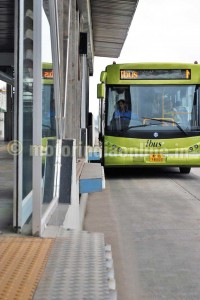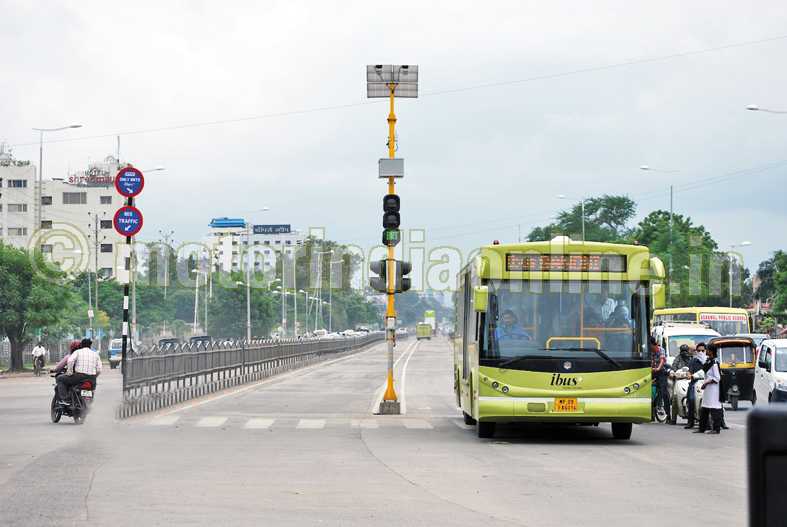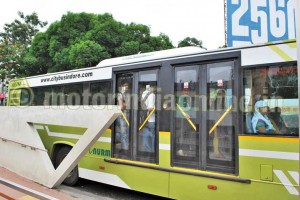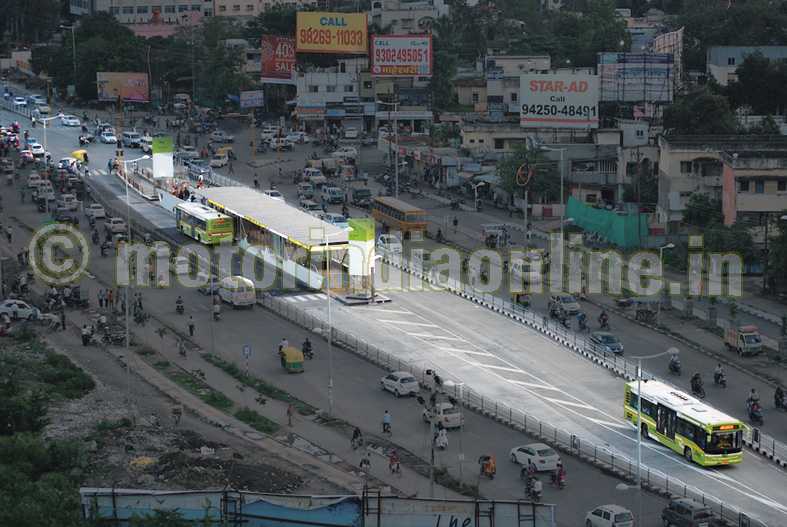Separate lane for air-conditioned vehicles

Indore’s iBus BRT service now transports more than 23,000 passengers per day, proving to be an affordable, convenient and comfortable mode of transport, even as the iBus completed 100 days of operation on August 14.
The iBus is Indore’s first-ever full BRT system, with a dedicated lane for its air-conditioned buses. At present, 13 buses run on an 11.45 km stretch on the city’s arterial AB Road. There are 21 stations on the corridor, and buses run from 7 a.m. to 11 p.m. The iBus is an affordable public transport service, with a simple fee structure. Travel up to two km costs Rs. 5, up to 8 km Rs. 10 and above 8 km costs Rs. 15.
As the commercial hub and the largest city in Madhya Pradesh, Indore has a population of over 2.29 million. The city witnessed increased road congestion, travel delays, traffic accidents and vehicular pollution. A modern, safe, efficient public transit system was needed to mitigate these problems.
Atal Indore City Transport Services Ltd. (AICTSL), Indore’s city transit agency, supported by EMBARQ India, launched a trial phase of the iBus BRT corridor in May 2013. During this phase, six custom-made air-conditioned BRT buses ran for six hours a day.
On the first day of the trial run itself, 2,000 people travelled, and positive public response saw the iBus scale up to eight buses, running full-day operations. Fare collection was introduced in June.

The current 11.45-km stretch on the city’s arterial AB Road marks the first phase of the project. The entire project will be an 88.4-km bus rapid transit network, to be completed in two further phases. At full fleet strength, the iBus will have 50 buses in total, and is expected to serve over 50,000 passengers per day, at conservative estimates.
In 2012, city buses in Indore carried approximately one lakh passengers per day. With the iBus BRT, at full strength of 50 buses, the total number of passengers using public bus transport is expected to grow to 150,000 per day. Thus, the iBus will increase the public transport share by 50 per cent, and help save about 10 lives from road accidents every year.

The iBus is India’s second Full Bus Rapid Transport System, a sophisticated bus service that has its own dedicated lane, on city streets. A BRT also makes use of bus stations (instead of bus stops) where passengers can buy tickets before boarding the bus. This allows for faster, more orderly boardings, similar to metro rail systems. When compared to traditional bus systems, BRT is a fast, efficient, safe and user-friendly mode of transport.
Many cities are now choosing BRT systems for two important reasons: cost and convenience. The cost of building a heavy rail system can be as much as 10 times that of building a BRT. What’s more, cities that opt for BRTs can see results immediately – installing a BRT system can be completed within two-three years, whilst building a metro can take up to a decade.
With 21 stations, the current 11.45-km stretch on the city’s arterial AB Road marks the first phase of the project. The entire project will be an 88.4-km bus rapid transit network, to be completed in two further phases.
At full fleet strength, the iBus will have 50 buses in total, and, at conservative estimates, is expected to serve over 50,000 passengers per day.
The iBus will improve public transportation scenario in the city and enhance the overall quality of life for the residents of Indore.
The iBus is a shining example of what can be achieved when multiple city agencies work collaboratively, with strong leadership at the helm.

Partnership approach
Since early 2008, AICTSL has partnered with EMBARQ India for providing technical support to the iBus project and EMBARQ is working closely on various aspects of the BRTS project. AICTSL has also partnered with CEPT University, Ahmedabad, for redesigning of the corridor to have median-island bus stations.
EMBARQ India is a member of the EMBARQ network, which includes centres in Mexico, Brazil, India, Turkey and the Andean region. EMBARQ catalyzes and helps implement environmentally, socially and financially sustainable urban mobility and urban planning solutions to improve people’s quality of life in cities. It works with local transport authorities and policy makers, to help reduce pollution, improve public health, and create safe, accessible and attractive urban public spaces. The network employs more than 100 experts in fields ranging from architecture to air quality management; geography to journalism; and sociology to civil and transport engineering. Learn more at www.embarqindia.org
EMBARQ is a non-profit initiative of the World Resources Institute (www.wri.org), an environmental think-tank in Washington D.C. that goes beyond research to find practical ways to protect the earth and improve people’s lives.